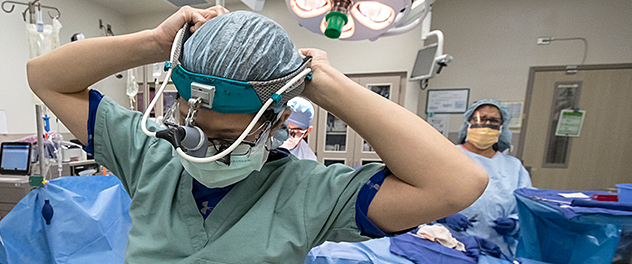 Decreasing work burdens; increasing surgeon safety and satisfaction
Decreasing work burdens; increasing surgeon safety and satisfaction
The Mayo Clinic Human Factors Engineering Lab seeks to discover new ways to apply ergonomics and human factors principles to understand and optimize operative work systems, clinical performance and well-being.
Overview
The Human Factors Engineering Lab at Mayo Clinic is directed by Susan Hallbeck, Ph.D., PE, CPE. The lab's research team collaborates with clinicians, scientists and patients to identify and solve critical health care issues. As part of the lab, the team uses scientific engineering methodology with provider and engineering partnerships to solve complex problems and improve quality of life for clinicians and patients.
One key area of study focuses on helping surgeons reduce physical injury from long operations, which put a strain on muscles and joints. In addition, the team also examines ways to reduce the mental stress surgeons may experience from surgeries that require intense concentration.
Dr. Hallbeck's research team has expertise and research interests in human systems integration, human factors engineering, ergonomics and biomechanics. Her group focuses on improving technologies and health care system efficiency within the physical and psychological limitations of clinicians, staff and patients.
The Human Factors Engineering Lab team's expertise includes:
- Ergonomics. The multidisciplinary team studies physical and cognitive ergonomics and biomechanics to optimize task performance and staff well-being.
- Work-system evaluation. Research team members identify suboptimal workflows and work environments and develop strategies to address these concerns.
- Patient and health care professional safety and wellness. Investigations focus on designing and re-engineering health care delivery operations to optimize both patient safety, and professional safety and wellness.
- Usability. Research team members design systems that support user needs and assess functionality and impact.
- Teamwork. Research focuses on the performance of clinical teams to identify key characteristics and behaviors that support task performance, patient safety, and staff safety and well-being.
Ergonomics education
To learn more about the importance of ergonomics in the OR, take a short, self-paced training module that meets the Surgical Council on Resident Education (SCORE) curriculum criteria. No sign-up is required, and the training is accessible on a computer or mobile device. The Surgical Ergonomics course is designed modularly with five short lessons, each taking less than five minutes to complete, and is easy to stop and start.
If you have questions or comments about these modules, contact ErgoEd@mayo.edu.
Affiliations
The Human Factors Engineering Lab works with the Robert D. and Patricia E. Kern Center for the Science of Health Care Delivery and the Kern Center's Human Factors Engineering Program.
About Dr. Hallbeck
Susan Hallbeck, Ph.D., a Certified Professional Ergonomist and licensed professional engineer, is a professor of health care systems engineering at Mayo Clinic College of Medicine and Science in Rochester, Minnesota. She is past-president (2019-2020) and a fellow of the Human Factors and Ergonomics Society, a fellow of the International Ergonomics Association and president (2023-2024) of the Society of Surgical Ergonomics. Dr. Hallbeck's research is focused on applying ergonomics to benefit surgical work systems, clinical performance, and surgeon and surgical team well-being and patient safety.
OR-Stretch App
To alleviate the physical discomfort surgery imposes, try out our convenient OR-Stretch web app. Following this protocol can help reduce the risk of developing musculoskeletal issues that can shorten surgeons' careers.
The OR-Stretch app guides surgeons through intraoperative stretches and includes a reminder for stretching. To use OR-Stretch, simply log in to the web app using an email address; a password is not required. You will be asked to complete a brief demographic survey after logging in the first time. You will be sent periodic emails to help Mayo Clinic improve OR-Stretch.
Use this OR-Stretch app QR code:

Go to OR-Stretch application instructions to print for posting.
Access the OR-Stretch poster featuring standing stretches to print for posting.
Print the OR-Stretch poster showing sitting stretches for posting.
Email ORStretch@mayo.edu with your questions or comments.
Videos
Dr. Hallbeck's Human Factors Engineering Lab has developed instructional videos to guide surgeons through a set of stretches, enabling surgery to continue without interruption and with minimal physical strain and stress.
OR-Stretch from web app. These videos demonstrate short intraoperative stretches, performed without breaking scrub, to counteract the effects of intraoperative strains related to surgeon positions and postures.